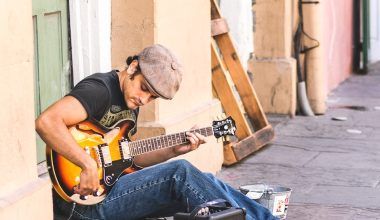The term “open mic” has become popular in creative communities. But what does open mic really mean? Open mic, short for “open microphone,” refers to events where performers can showcase their talents in front of a live audience. These events are open to anyone willing to participate, whether they’re singers, poets, comedians, or storytellers.
Open mic nights create a platform for both amateurs and professionals to share their craft. It’s a space where creativity meets spontaneity. The open mic meaning is rooted in the idea of inclusivity, giving everyone an equal opportunity to perform.
Origins of Open Mic: How It All Began
To truly grasp the open mic meaning, it’s helpful to look at its history. Open mic events date back to the early 20th century. They were initially popular in cafes and bars, where poets and musicians would gather to perform for small audiences.
By the 1950s, open mic events became a staple of the beatnik culture in America. Writers, poets, and singers would take the stage to express themselves. The format gained more recognition with the rise of folk music and stand-up comedy in the 1960s and 1970s.
Who Can Participate in an Open Mic?
One of the most beautiful aspects of the open mic meaning is its inclusivity. Anyone can participate, regardless of skill level or experience. Here’s a look at some performers who typically take part:
- Singers and Musicians: A popular category at open mics. Performers often use the platform to test new songs or gain confidence.
- Comedians: Stand-up comics frequently use open mic nights to practice their material.
- Poets and Writers: Spoken word artists and poets bring their verses to life at open mics.
- Storytellers: Some events focus on personal storytelling or dramatic readings.
- Dancers and Other Artists: In some cases, open mics welcome performers from other disciplines.
The open mic meaning embodies the idea that creativity has no boundaries.
Why Are Open Mics Important?
Open mic nights play a vital role in the creative community. Here’s why they matter:
- Platform for Emerging Talent: Open mic events provide newcomers with a stage to perform without judgment.
- Creative Experimentation: Artists can try new material and receive instant audience feedback.
- Networking Opportunities: Open mic nights connect artists, venue owners, and audiences.
- Confidence Building: For those nervous about performing, open mics offer a supportive environment to overcome stage fright.
Understanding the open mic meaning also highlights its importance in shaping the careers of countless artists.
How to Prepare for Your First Open Mic
If you’re planning to perform at an open mic, preparation is key. Here’s how you can get started:
- Understand the Format: Check the rules of the event. Some open mics limit the time or type of performance.
- Rehearse Your Material: Practice your act to ensure you’re comfortable and confident.
- Keep It Short: Open mic slots are usually brief, so focus on quality over quantity.
- Engage with the Audience: Interaction makes your performance more memorable.
- Accept Feedback: Constructive criticism helps you grow as an artist.
Performing at an open mic is a fulfilling experience. Embracing the open mic meaning allows you to enjoy the process, even if it’s your first time.
Types of Open Mic Events
Open mic nights are not one-size-fits-all. They cater to various art forms and audiences. Let’s explore the most common types:
- Music Open Mics: These events are tailored for singers, bands, and instrumentalists.
- Comedy Open Mics: Stand-up comedians use these to test new jokes.
- Poetry Slams: Focused on spoken word and poetry, these events are often deeply emotional.
- Storytelling Open Mics: Personal stories and narratives take center stage here.
- Mixed Open Mics: These combine different art forms, making them diverse and exciting.
Each type adds its unique twist to the open mic meaning, offering something for every performer.
Tips for Organizing an Open Mic Event
If you’re considering hosting an open mic, here are some tips to ensure its success:
- Choose the Right Venue: Pick a location that’s accessible and has good acoustics.
- Set Clear Guidelines: Communicate time limits and other rules to participants.
- Promote the Event: Use social media and local networks to attract performers and audiences.
- Provide Necessary Equipment: Ensure there’s a microphone, sound system, and lighting.
- Encourage Feedback: Gather opinions to improve future events.
Organizing an open mic gives you a deeper understanding of the open mic meaning while fostering a sense of community.
The Role of Open Mic in Modern Culture
Open mic nights have become a cultural phenomenon. They’ve shaped modern art, music, and comedy. Many famous artists, like Ed Sheeran and Amy Schumer, began their careers at open mics.
In addition to nurturing talent, open mic events promote inclusivity. They create safe spaces for people to express themselves without fear of judgment.
Common Misconceptions About Open Mic Events
Some people misunderstand what open mic events are about. Let’s debunk a few myths:
- “Only Professionals Participate”: Open mics welcome everyone, regardless of experience.
- “It’s All About Music”: While music is common, open mics feature a variety of performances.
- “Audiences Are Critical”: Most open mic audiences are supportive and understanding.
Knowing the true open mic meaning helps break these misconceptions.
Why You Should Attend Open Mic Nights
Even if you’re not performing, attending an open mic night is rewarding. Here’s why:
- Discover New Talent: You might witness the rise of the next big star.
- Support Local Artists: Your presence encourages performers.
- Enjoy Unique Experiences: Every open mic night is different.
Whether as a performer or spectator, the open mic meaning extends to fostering creativity and connection.
Conclusion
The open mic meaning goes beyond its literal definition. It represents opportunity, creativity, and community. Whether you’re a performer or an audience member, open mic events offer something unique for everyone.
By embracing the open mic culture, you’re contributing to a larger movement that celebrates art in its rawest form. So, grab a microphone, step on stage, or simply watch from the crowd—there’s always a place for you in the open mic world.
Related Articles:
For further reading, explore these related articles:
- Mike Price List: Find the Best Microphone for Your Needs
- Best Professional Microphone for Singing: A Detailed Guide
For additional resources on music marketing and distribution, visit Deliver My Tune.






